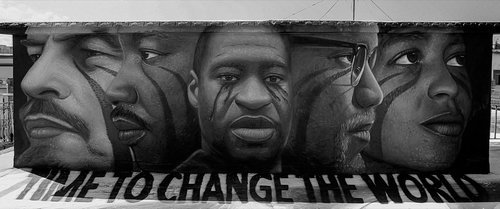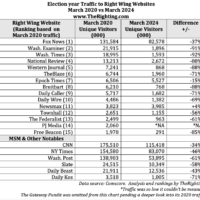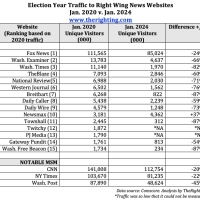
“Uncle Tom II” Filmmakers Want Black Americans to Vote Republican
Marketing material for “Uncle Tom II,” which begins streaming today, claims that the film will unveil “the Marxist strategy of creating false racial tension between Americans.” “Uncle Tom II” asserts that the racial justice protests of 2020 were a key facet of that strategy.
By Michael Lovito, August 26, 2022
Salem Media Group, the company behind the far right fantasy film “2000 Mules,” which earned $2.5 million reinforcing the Big Lie about the 2020 presidential election, is coming back for more.
Today, Salem will premiere its latest film, “Uncle Tom II: An American Odyssey.” Directed by Justin Malone and co-written and produced by Black conservative radio host and onetime California gubernatorial candidate Larry Elder, the marketing copy for “Uncle Tom II” claims that the film will unveil “the Marxist strategy of creating false racial tension between Americans, and its ultimate goal of obtaining power, destroying capitalism and replacing God with government.” The film claims the racial justice protests of 2020 were a key facet of that strategy.
Conservatism vs. Liberalism
As the title suggests, “Uncle Tom II” is a sequel to “Uncle Tom,” Malone’s 2020 documentary that set out with the slightly more modest goal of profiling prominent Black conservatives and making the case to Black Americans as to why they should vote for Republicans. The titular “Uncle Toms” are people like Elder and “Uncle Tom II” co-writer Chad O. Jackson – Black conservatives who feel ostracized by their fellow African-Americans, 87 percent of whom voted for Joe Biden in 2020.
The central thesis of the film is that, contrary to claims that Black conservatives think and vote the way they do merely to curry favor with white people, conservatism is actually more beneficial to the African-American community than liberalism, which the film claims is just a tool that ruling “elites” use to hold on to their power.
It’s a provocative stance, but the idea that the Republican Party is gaining some traction with Black voters is not without merit. Although Donald Trump won only 12 percent of African-American voters in 2020, that still stands as an eight percent improvement over his 2016 numbers. This year, a record number of Black Republicans decided to run for Congress, and Joe Biden’s polling numbers with Black voters continue to slip.
Are Malone and elder on to something, or is the niche explored by “Uncle Tom” too small to make a real impact?
An election year polemic
According to an interview Malone gave to the conservative Washington Times, the idea for the original “Uncle Tom” came to him in 2011 after watching MSNBC’s Lawrence O’Donnell accuse Republican presidential candidate Herman Cain of “sitting on the sidelines” during the Civil Rights Movement.
“It just seemed silly to me, to think that Black people couldn’t be conservative or couldn’t be Republican,” Malone, who is white, told the newspaper. He began production on the film by interviewing Black conservative figures in the Dallas area, where Malone works as a commercial director. After shooting interviews with Jackson and Black conservative activists like Eugene Ralph and Stephen Broden, Malone shopped a rough cut of “Uncle Tom” around Los Angeles. Eventually he came into contact with Elder, who helped Malone raise money to cover production costs and put him in contact with some of the biggest names in Black conservatism.
A Who’s Who of Black Conservatives
Shot in stark black and white, “Uncle Tom” consists primarily of interviews with Black conservative pundits like Elder, Jesse Lee Peterson, and Candace Owens, politicians like Texas Republican Party Chair Allen West, Nashville mayoral candidate Carol Swain, and the aforementioned Cain, as well as a handful of Black small business owners like Jackson.
In addition to discussing what appeals to them about conservatism, the interviewees recount the lives and careers of influential Black conservative figures like Booker T. Washington, Thomas Sowell, and Ben Carson. They also discuss the Democratic Party’s historical support of slavery and segregation, and the importance of education and hard work, values that are held up as essentially Republican and antithetical to liberalism, which the film claims promotes a sense of perpetual victimhood and reliance on government largesse.
No Biden, Some Trump
Despite being released in 2020, that year’s presidential campaign plays a relatively minor role in the first “Uncle Tom’s” narrative. Clips of 2020 Democratic presidential aspirants appealing to Latino immigrants (all set to flamenco music) are presented as an effort by the party to help import a “whole new victim class.” But Joe Biden, despite his own sketchy past on racial issues, is never mentioned. According to Malone, this omission was intentional to prevent the film from becoming a “hit piece.”
Donald Trump, on the other hand, is presented as the antidote to Republicans’ dismal efforts to appeal to Black voters, partly because of his uncompromising and belligerent public persona, partly because his presence in popular culture made him more recognizable to voters. Curiously, Black Republicans running for office in 2020 like Michigan Senate candidate John James and Florida House candidate (and eventual Congressman) Byron Donalds are never mentioned.
An underground hit?
According to a press release published shortly after “Uncle Tom’s” release, the film made $400,000 off of “streamed downloads” in its opening weekend, and Malone would go on to claim that the film made more than $2.5 million as of August 2020. As we noted when covering “2000 Mules,” Salem Media’s prior film, it’s virtually impossible to confirm any film’s streaming revenues since, unlike box office numbers, they’re all self-reported by the film’s creator and/or distributor. But if “Uncle Tom’s” revenues are anywhere close to what Malone claims, it’s an impressive showing for a documentary that lacked the backing of an established studio or distributor and, outside of screenings at film festivals, was never released theatrically.
What makes this feat doubly impressive is that “Uncle Tom,” despite its provocative title and big-name cast, received little mainstream media attention. According to Rotten Tomatoes, it received only three reviews – from evangelical Christian magazine World, pay-to-play review site Film Threat, and freelance Australian film critic Matthew Pejkovic.
Under the Radar . . . for Now
Despite an impending theatrical premiere and a distribution deal with emerging conservative studio Salem Media, “Uncle Tom II” is also struggling to generate any critical hype. While Jackson and Malone have appeared on conservative talk shows promoting the film, the only review of “Uncle Tom II” published at the time of this writing can be found in The Epoch Times, a far-right newspaper owned by the Falun Gong religious movement.
Of course, that could also be a selling point for Salem Media’s target audience. “2000 Mules” was roundly criticized by both liberal and mainstream and by anti-Trump conservatives at The Bulwark and The Dispatch, but that didn’t prevent Salem Media from recouping its $4.5 million investment in the film.
If anything, the under-the-radar nature of “Uncle Tom II” could help Salem Media and Malone market the film as something underground and transgressive, a victim of the same kind of persecution they allege Black conservatives are subjected to, a hidden document that “they” don’t want you to see. In fact, its creators are already discussing it in those terms.
“What ‘Uncle Tom II’ does is take a look at this history that existed with Black Americans, a history rooted entrepreneurship, prosperity, and patriotism that’s completely covered up,” Jackson told Newsmax. “We expose why that is.”
Michael Lovito is a Brooklyn-based reporter and critic whose work has appeared in Salon, Brooklyn Magazine, Pavement Pieces, and The District. He also serves as editor-in-chief of the politics and pop culture website The Postrider. @MLovito
Interested in more news about right-wing media curated especially for mainstream audiences? Subscribe to our free daily newsletter.
























